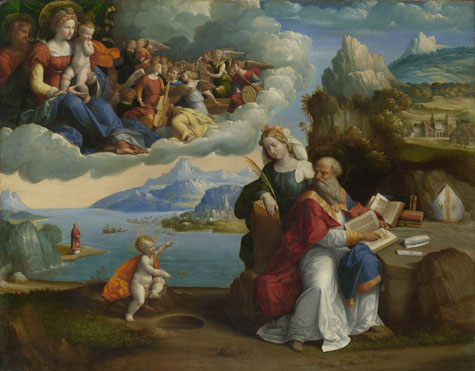The Manicheans perceived the wonders of nature, the sea, the sky and the fire, as though they were Divine. They saw God working in, manifest, in nature.
"Water [that is, water apart from the deleterious elements that have become blended with it] was regarded by Mani as one of the divine elements. The ablutions in running water mentioned above in connection with the prayers may have sustained some relation to baptism, but can hardly be ascribed to Christian influence. It is certain that Mani's father was connected with a baptizing party, viz., the Mugtasilah. According to the Fihrist Mani was the author of an Epistle on Baptism."
- Albert H. Newman
- Albert H. Newman
There is a painting in the National Gallery in London, which I would say (on the theme of the Divine Elements), is quite Manichean in character:
"A picture frequently seen and known as the Vision of Saint Augustine illustrates the legend that, as the saint walked on the seashore, he saw a child who, having dug a hole in the sand, was filling it with water. When the saint asked the child what he did, the child replied that he intended to pour all the water of the sea into this hole."When the saint assured him that such a task could never be finished, the child replied, "It is no more impossible to do this than for thee to comprehend and explain the mystery on which thou art meditating!""
Catherine of Alexandria sits behind Augustine with her eyes closed. Perhaps she has learnt the lesson, as she was said to have been learned in the sciences.
In the distance a priest (or a deacon), said to represent St. Stephen, stands holding a tray on which appears to be sea shells.
Augustine, who has had his head stuck in some books, has a look of disdain on his face as he looks around at the child Jesus. The painting does not appear to be sympathetic to Augustine at all. Jesus points out at the light-filled landscape, in which we could say divinity is living.
Augustine had a Christian mother and a pagan father. I don't think he saw Mani as non-Christian. The Manicheans were very helpful to him in the nine years he followed their system. He certainly appreciated their philosophy of freedom!
Augustine had a Christian mother and a pagan father. I don't think he saw Mani as non-Christian. The Manicheans were very helpful to him in the nine years he followed their system. He certainly appreciated their philosophy of freedom!

No comments:
Post a Comment